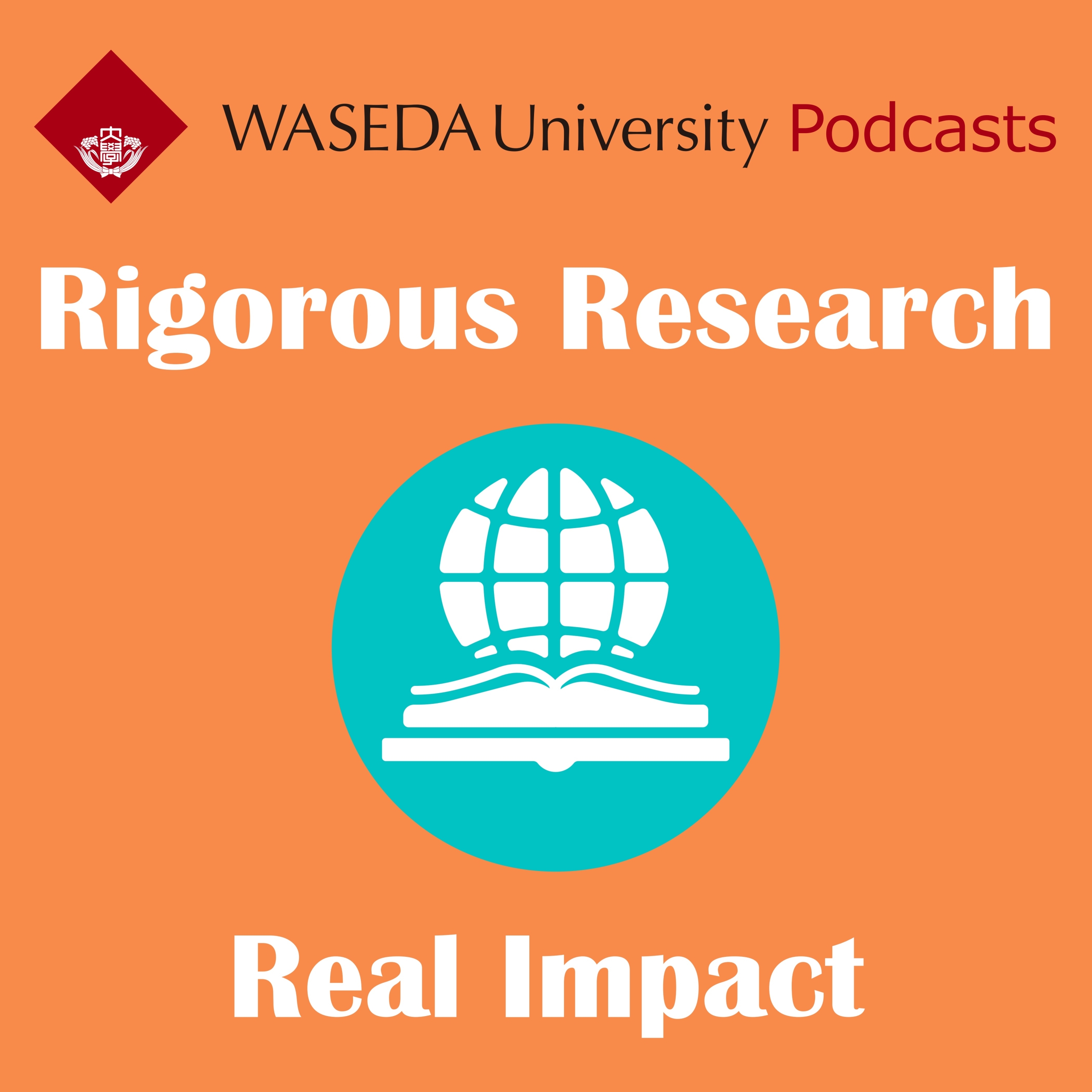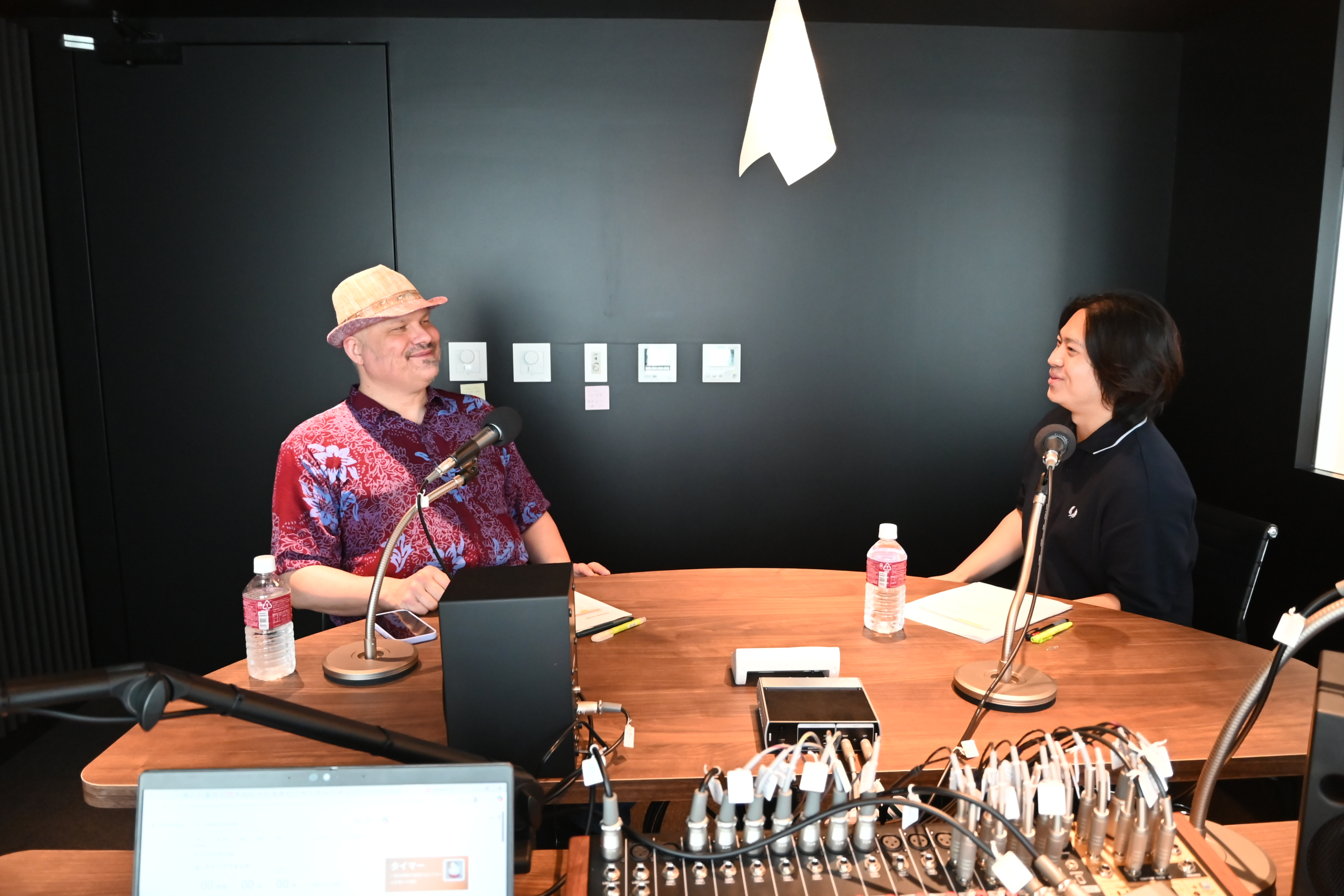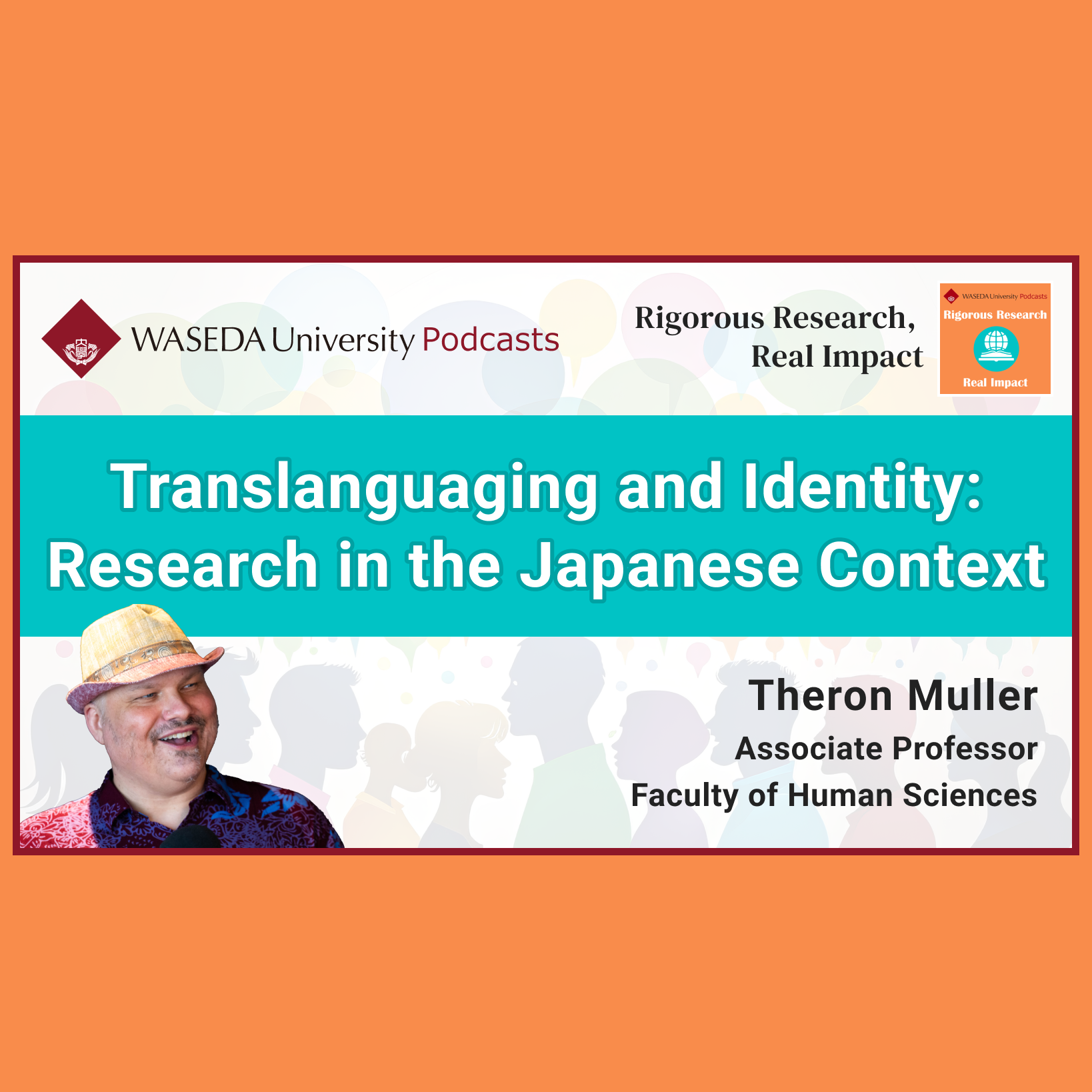Waseda Podcasts: Rigorous Research, Real Impact– “Translanguaging and Identity: Research in the Japanese Context”
Tue, Sep 23, 2025-
Tags
Waseda University released the first episode of season two “Translanguaging and Identity: Research in the Japanese Context” of its English language podcast series “Rigorous Research, Real Impact” on September 23, 2025. All podcast episodes are available for free on Spotify, Apple Podcasts, Amazon Music, and YouTube.
Episode 1: “Translanguaging and Identity: Research in the Japanese Context”
In this season two inaugural episode, Associate Professor Theron Muller from the Faculty of Human Sciences joins PhD student Peter Chai (Graduate School of Political Science) to discuss his research on translanguaging, which views languages as interconnected and synchronously working together, within the Japanese sociolinguistic context. The episode also highlights one of Waseda’s innovative English-based degree programs in the Graduate School of Human Sciences, where Professor Muller teaches. Additionally, he offers valuable insights for researchers considering academic careers in Japan, emphasizing both the unique opportunities and cultural transitions involved in joining Waseda’s vibrant community.
The research this episode is based on:
Muller, T., & Adamson, J. L. (2024). Translanguaging in writing for academic and publication purposes: Autoethnographic insights from the japanese tertiary context. In Researching Multilingually: Conceptual and Methodological Failures, Struggles and Successes (pp. 55-75). Channel View Publications. https://doi.org/10.21832/9781788925709-005

About Season 2:
Season two will feature eight knowledgeable Waseda researchers casually conversing with Waseda PhD students about their recent, rigorously conducted research in the humanities/social sciences, their thoughts on working in Japan at Waseda, and the merits of the English-based degree programs they are a part of. Short 15-minutes episodes will cover a range of themes that include legendary game designer Hideo Kojima, territorial disputes in Northeast Asia, and hybrid peacebuilding. It’s the perfect choice for international listeners considering attending university in Japan, current students contemplating further study in graduate school, and researchers looking to make the move to Japan and work for a university that stresses the importance of interdisciplinary approaches.

Recording in the Waseda International House of Literature (Haruki Murakami Library)
About the Guest:
Dr. Theron Muller is an associate professor in the Faculty of Human Sciences, Waseda University. He has lived in Japan, including Nagano, Toyama, and Saitama, since 2000. Prof. Muller is an applied linguist and his interests include sociolinguists and English language teaching, specfically the interaction of language, society, and identity.
Transcript:
Introduction
Peter Chai (00:06):
Hello and welcome to Waseda University’s English podcast series titled Rigorous Research, Real Impact. In this series, we dive into interesting conversations and stories from Waseda’s vibrant academic and cultural community. I’m your host, Peter Chai, a PhD student in the Graduate School of Political Science here at Waseda. Today, we’re exploring the fascinating world of sociolinguistics. We’ll be discussing how language shapes our society, our interactions, and even our identities. It’s a field that reveals the intricate connections between the words we use and the world we live in.
Peter Chai (00:44):
To guide us through this topic, we are honored to have Associate Professor Theron Muller from the Faculty of Human Sciences at Waseda University. Professor Muller specializes in the sociolinguistics of education and communication, with a particular focus on translanguaging and the academic writing practices of scholars in Japan. Welcome to the show, Professor Muller.
Professor Muller (01:03):
Thank you very much for the invitation. I really appreciate this opportunity to share about my research.
What are Sociolinguistics and Translanguaging?
Peter Chai (1:09):
Let’s dive right into your research. Your work centers on sociolinguistics and translanguaging. For our listeners who might be new to these terms, could you briefly explain what they mean? To you, what are the most interesting and challenging points about doing research in sociolinguistics?
Professor Muller (1:24):
That’s a good question. In my undergraduate class, Introduction to Sociolinguistics, this is the topic of the first lecture that I give: linguistics, applied linguistics, and then sociolinguistics. So basically, in a very short nutshell, linguistics is interested in describing the structure of language. So, you might have heard that English is subject-verb-object, whereas Japanese is subject-object-verb. So, thinking about how languages are put together or combined. Applied linguistics is interested in how language is actually used in the world. And then, as a part of applied linguistics, sociolinguistics is interested in the intersection of how people use language and society. So, from a very broad perspective, how society shapes language, and then also how language shapes society in turn.
Inside that, translanguaging is actually quite specific, and it’s a relatively new term in sociolinguistics. It used to be, like in language teaching research, there was something called code-switching, which means switching from one language to another. And then later on, there became this description of multilingualism, or people being able to speak multiple languages and switching between multiple languages. And one criticism of multilingualism is that it looks at languages as separate things. But neuroscience research has basically found that there aren’t separate language locations in the brain. If you speak English and you speak Japanese, you’re using the same parts of the brain to speak both. And so, translanguaging talks about how a translanguaging perspective views languages as interconnected and synchronously working together, as opposed to being separate things that people switch back and forth between.
Translanguaging in Academic Life in Japan
Peter Chai (03:20):
Thank you so much, Professor, for explaining what sociolinguistics is. In your recent work, you explore translanguaging through collaborative autoethnography. What are some of the key insights you’ve gained about how we use multiple languages in our professional and academic lives here in Japan?
Professor Muller (03:36):
So, the research that I’ve looked at in terms of collaborative autoethnography explores how even though research publication might be produced in English, there are a lot of languages that feed into producing that English publication. As an example, the recent Kaken research that I’m starting to wrap up—for those who aren’t familiar with Japanese, Kaken is a kind of national-level grant for doing research in Japan. So, this grant research that I’m starting to wrap up, in order to get ethical approval for it, I needed to submit Japanese language documents. And those Japanese language documents, while they don’t appear in publication, were definitely part of that research process. So, that’s what Professor John Adamson from Niigata Prefectural University and I explored in our recent collaborative autoethnographic investigation.
From the Classroom to Research: The Path to Studying Translanguaging
Peter Chai (04:30):
Thank you for the explanation of your research. It makes me wonder about your own journey. As I know, you have had a long career as an educator in Japan and abroad. Which countries have you worked in? How did your experiences in the classroom lead you to investigate translanguaging through autoethnography?
Professor Muller (04:46):
So, the answer to that question is, I’ve lived in Japan since 2000. So, I finished my undergraduate degree in 2000, and then I moved to Japan. However, I did all of my graduate work with UK universities. And I also have worked for the University of Birmingham and the University of Leicester on their master’s programs. And so, while I’ve been in Japan, I’ve worked with a variety of different universities.
The answer to the question of how my experiences in the classroom led me to investigate translanguaging is, first of all, my background is in language education. And so, with a background in language education, a big question that’s asked is, should teachers try to stick to the first language, which is kind of a popular theory in Japan, or should teachers and students move back and forth between the first language and the second language? And when you expand that out to research practice, you have a similar theme. Like, you’re working on your PhD right now, and you might be hearing conversations about how publishing in English is really important. But at the same time, only English doesn’t necessarily get you where you need to be. For example, for me to get my ethics application approved, I needed to be able to deal with documents in Japanese. And so that’s kind of how I started to investigate those issues.
Japan as a Unique Context for Sociolinguistics Research
Peter Chai (06:06):
It’s fascinating how your personal and professional experiences in Japan have shaped your research. That leads me to a broader question about the context itself. What makes Japan a particularly significant context for studying translanguaging and the social aspects of language?
Professor Muller (06:21):
So, I think that’s quite a good question to ask. I feel like one interesting part of Japan is you have an intersection of a kind of narrative of Japanese identity as the only kind of identity, whereas in reality, there have been academic books published talking about multicultural Japan. And so, with my students, who are almost all Japanese in that Introduction to Sociolinguistics class that I mentioned, when we start talking about different issues of language variation, they’re very conscious of and very sensitive to the fact that people who aren’t from Tokyo, when they move to Tokyo for university, they need to change how they talk. And Japan is really interesting because it’s a kind of destination for many Asian students. And so, you can often have a quite complex mix of languages among the students that I think is very worthy of investigation.
Peter Chai (07:20):
Thank you so much. How does studying these phenomena in a context often perceived as monolingual challenge or enrich our understanding of multilingualism on a global scale?
Professor Muller (07:30):
The answer is in the question itself. The question talks about how it’s often perceived as monolingual, but the reality is if you walk down the streets of Tokyo, you’ll see people who speak a variety of different languages. And so, what sociolinguistics is interested in is understanding how, when people with various languages come together, they manage to interact. My wife works at a hospital as a nurse, and they have a variety of caregivers who are from Myanmar. And so, one question that you could ask is a kind of sociolinguistic question: how do the nurses at that hospital, who are primarily Japanese, develop relationships with these nursing care workers who are not Japanese? And how does language fit into that process of building relationships?
Studying at Waseda’s Graduate School of Human Sciences
Peter Chai (08:19):
Thank you so much for explaining the significance of doing research in Japan. I’d like to shift our focus now for the benefit of potential future Waseda students who might be listening. For them, what makes Waseda’s Graduate School of Human Sciences and its English-based degree programs a unique place to study?
Professor Muller (08:36):
The English-based degree program at the Faculty of Human Sciences is relatively new. We’re just going into our fourth intake now, and it’s seen an explosive growth in popularity. I think one impression a lot of people have of graduate school in Japan is that it’s very kind of Asia-centric, like there’s certain countries in Asia that students tend to come from. I think one nice aspect of our program is we have representation from a much broader expanse of the world. So, we have students from Latin America, and then we have students that are from Europe and also from the western part of Asia, not just the eastern part of Asia. So, it makes for a really international and dynamic space for students to be able to learn and to pursue their research.
Peter Chai (09:28):
Thank you so much. I know you’re teaching a course called Applied Linguistics in Practice. Could you tell me more about the course? How can students learn and experience in that course?
Professor Muller (09:38):
The Applied Linguistics in Practice course that I teach is a graduate-level, one-quarter course, so it’s quite a fast course. And so, one of the first things that I do is I show the table of contents from an applied linguistics book which has like 30 different chapters. And I explain to them that over the course of seven classes, it’s impossible for us to cover all 30 of those chapters. Instead of trying to do a kind of shallow overview of all of applied linguistics, what I try to do in that course is I try to touch on issues of how to think about doing applied linguistic research and how to think about using the methods of applied linguistic research in their own dissertation studies.
Advice for Future Students and Researchers
Peter Chai (10:17):
Professor Muller, this has been an incredibly insightful conversation. Before we finish, do you have a final message for students around the world who might be thinking about studying at Waseda?
Professor Muller (10:26):
So, I think the experience I have is teaching on our English language degree program at the Faculty of Human Sciences. And I would say it’s quite a competitive program for students to apply to. So please don’t feel discouraged by that. But the students who tend to be successful have a very clear research project that they’re looking to pursue, and they’re able to connect that research project to a professor’s already existing research interests. So, they can find a professor at the faculty who can help them to be successful in that research project. I would also say that, a bit different from master’s programs elsewhere, students are expected to submit a proposal with their application package. And so, I feel like students may need to be quite far along in terms of having experience of doing research. If they’re relatively inexperienced in doing research, it’s probably going to be quite a difficult application process.
Peter Chai (11:26):
Thank you, Professor. Do you have any message for researchers like you who might be interested in taking up a position in Japan?
Professor Muller (11:33):
The answer to that question is, with politics the way they are and global higher education in the state that it is around the world, I would say that Japanese higher education is facing its own challenges, but it also offers really exciting opportunities for faculty who are interested in making the transition. But I would say to keep in mind that in most cases, it’s not just going to be a simple move; it’s going to be a cultural and a language transition as well. And so, to keep that in mind and to come with an open mind, but also to remember that there are lots of opportunities and lots of advantages to being based in Japan. You get really easy access to a lot of places that otherwise would be quite difficult to access if you were based elsewhere.
Conclusion
Peter Chai (12:21):
Thank you so much for your time and for sharing your expertise with us, Professor Theron Muller.
Professor Muller (12:25):
Thank you very much for having me.
Peter Chai (12:33):
And thanks to all our listeners for tuning in. For more conversations from the corridors of Waseda University, don’t forget to subscribe and tune into the next episode on Rigorous Research, Real Impact. Until then, take care and stay curious.














